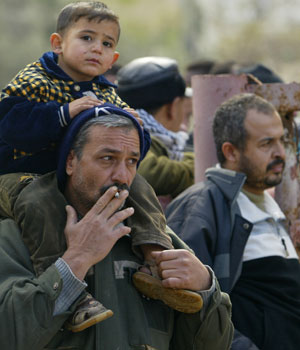
Unemployed Palestinians stage a protest demanding jobs in front of the offices of Palestinian leader Mahmoud Abbas in Gaza City, 18 January 2006 (AFP)
GAZA CITY, Gaza Strip (AP) – The two main contenders in next week’s Palestinian parliamentary election pledged to avoid violence on voting day and work together afterward, but a Hamas leader ruled out peace talks with Israel.
The no-violence pledge came Wednesday in Gaza, coupled with a promise that the ruling Fatah and its main challenger, the militant Islamic Hamas, will work together after the Jan. 25 election.
It was a tacit admission by Fatah that Hamas will be a significant factor in the new parliament. Hamas, running for the first time, is set to take advantage of voter dissatisfaction with a decade of Fatah rule because of widespread corruption and inefficiency, as well as its inability to control internal violence, some of it directly connected to the election.
In Nablus on Wednesday, a dozen Fatah gunmen took over the local court building, demanding that their representative, Jamil Tirawi, be restored to the 21st place on the Fatah list after he was dropped to 29th, witnesses said.
Then a smaller group of Fatah activists went to the hotel where European observers are staying and demanded that they take action. Hotel manager Awad Hamdan, who translated for the two sides, said the Fatah men warned if Tirawi is not moved up, “there won’t be elections in the refugee camps or the villages.”
In the southern Gaza town of Rafah on Wednesday, a Palestinian was killed when he was hit in the head by Fatah gunmen firing in the air during an election rally, witnesses said.
In Ramallah, meanwhile, Palestinian leader Mahmoud Abbas told reporters he would resign if the new parliament blocks his efforts to make peace with Israel. That was a direct reference to Hamas, which does not recognize the presence of a Jewish state in the Middle East and has sent dozens of suicide bombers who have killed hundreds of Israelis.
“I struggled and fought for Hamas to come to the legislature,” Abbas said, adding that he doesn’t mind if Hamas joins parliament as long as he can keep working for peace.
“I won’t say if Hamas joins I will withdraw,” he said. “There is a political program … and if I feel I can’t implement it, then staying in my chair is not the ultimate goal.”
“Maybe Hamas will change its policy, no one knows,” he said. “Maybe it will say it will accept negotiations.” However, a Hamas leader ruled out talks with Israel and threatened to kidnap Israeli soldiers.
At a campaign rally in Gaza, Hamas leader Mahmoud Zahar said the Islamic group «is not going to acknowledge the ownership of any inch of Israel on this holy land. We are not looking to Israel as a partner now or in the future.” He demanded that Israel release all Palestinian prisoners unconditionally. Otherwise, he said, “There is no option left except kidnapping soldiers and exchanging them for the detainees and prisoners.”
Israel and the U.S. consider Hamas a terror group, pointing to its refusal to accept Israel and its dozens of suicide bombing attacks that have killed hundreds of Israelis.
Polls show that Abbas’ Fatah Party is steadily losing ground against Hamas; a poll last week gave Fatah only 35 percent of the vote, compared to 31 percent for Hamas, or a 10-point gain for the militants within a month.
In Gaza, scene of repeated incidents in which gunmen, mostly from Fatah, have taken over government buildings and attacked election offices, Fatah and Hamas promised to leave their weapons at home on election day. “We reassure our people that we will work jointly and together after the elections God willing to enhance political partnership and strengthen the Palestinian institutions, and to cooperate in the benefit of our people and case,” a joint statement said.
The statement was prepared during a meeting between two of the main leaders of the Al-Aqsa Martyrs’ Brigades, a violent offshoot of Fatah, and senior Hamas members. Samir Mashharawi, a Fatah candidate, and Said Siam from Hamas read the statement to reporters.
“We reaffirm our commitment not to display weapons on election day,” Mashharawi read from the statement. “We urge our people to widely participate in the democratic process on Jan. 25, including our people in Jerusalem.”

Samir Mashharawi, a Fatah candidate for the upcoming Palestinian elections talks during a news conference in Gaza City, Wednesday Jan. 18, 2006 (AP)

Unemployed Palestinian chants during demonstration in Gaza City calling for jobs, in front of the Parliament building in Gaza City January 18, 2006 (REUTERS)
